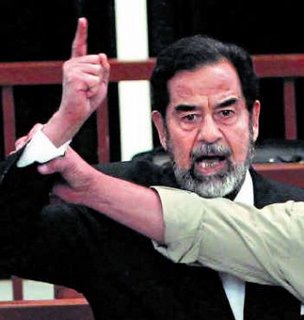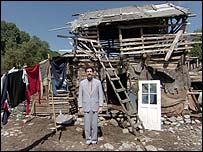This article came in from Pleiades. This bit is of great interest:
Since the devastating setbacks two years ago from the US-sponsored "color revolutions" in Georgia and then Ukraine, Russia has begun to play its strategic cards extremely carefully, from nuclear reactors in Iran to military sales to Venezuela and other Latin American states, to strategic market cooperation deals in natural gas with Algeria.Uhh-huh. And we don't see it happening. So we find that is, that there is a deep and abiding interest in controlling oil. Call it the smoking gun of motive and not having an alibi.
At the same time, the Bush administration has dug itself deeper into a geopolitical morass, through a foreign policy agenda which has reckless disregard for its allies as well as its foes. That reckless policy has been associated with former Halliburton chief executive officer and now vice president, Dick Cheney, more than any other figure in Washington.
The "Cheney presidency", which is what historians will no doubt dub the George W Bush years, has been based on a clear strategy. It has often been misunderstood by critics who had overly focussed on its most visible component, namely, Iraq, the Middle East and the strident war-hawks around the vice president and his old crony, Defense Secretary Donald Rumsfeld.
The "Cheney strategy" has been a US foreign policy based on securing direct global energy control, control by the Big Four US or US-tied private oil giants - ChevronTexaco or ExxonMobil, BP or Royal Dutch Shell. Above all, it has aimed at control of all the world's major oil regions, along with the major natural gas fields. That control has moved in tandem with a growing bid by the US for total military primacy over the one potential threat to its global ambitions - Russia. Cheney is perhaps the ideal person to weave the US military and energy policies together into a coherent strategy of dominance. During the early 1990s under father Bush, Cheney was also secretary of defense.
The Cheney-Bush administration has been dominated by a coalition of interests between Big Oil and the top industries of the American military-industrial complex. These private corporate interests exercise their power through control of the government policy of the US. An aggressive militaristic agenda has been essential to it. It is epitomized by Cheney's former company, Halliburton Inc, at one and the same time the world's largest energy and geophysical services company, and the world's largest constructor of military bases.
To comprehend the policy it's important to look at how Cheney, as Halliburton chief, viewed the problem of future oil supply on the eve of his becoming vice president. "Where the Prize Ultimately Lies", Cheney's 1999 London speech, was a full year before the US elections which made him the most powerful vice president in history. In it, Cheney gave a revealing speech before his oil industry peers at the London Institute of Petroleum. In a global review of the outlook for Big Oil, Cheney made the following comment:By some estimates there will be an average of 2% annual growth in global oil demand over the years ahead along with conservatively a 3% natural decline in production from existing reserves. That means by 2010 we will need on the order of an additional 50 million barrels a day. So where is the oil going to come from? Governments and the national oil companies are obviously controlling about 90% of the assets. Oil remains fundamentally a government business. While many regions of the world offer great oil opportunities, the Middle East with two thirds of the world's oil and the lowest cost, is still where the prize ultimately lies. Even though companies are anxious for greater access there, progress continues to be slow.The Cheney remarks are worth a careful reading. He posits a conservative rise in global demand for oil by the end of the present decade, ie in about four years. He estimates the world will need to find an added 50 million barrels of daily output. Total daily oil production at present hovers around the level of some 83 million barrels oil equivalent. This means that to avert catastrophic shortages and the resultant devastating impact on global economic growth, by Cheney's 1999 estimate, the world must find new oil production equal to more than 50% of the 1999 daily global output, and that by about 2010. That is the equivalent of five new oil regions equal to today's Saudi Arabian size. That is a whopping amount of new oil.
It is true that technology, privatization and the opening up of a number of countries have created many new opportunities in areas around the world for various oil companies, but looking back to the early 1990s, expectations were that significant amounts of the world's new resources would come from such areas as the former Soviet Union and from China. Of course that didn't turn out quite as expected. Instead it turned out to be the deep water successes that yielded the bonanza of the 1990s.
So Long, Mother Of All Jokes
Which brings me to the news of the day, Saddam is going to the gallows.

Former Iraqi leader Saddam Hussein was sentenced to death by hanging today for his role in the killing of 148 Shiite Muslims in the northern Iraqi village of Dujail following an attempt on his life there in 1982.I wonder when people will start to realise that the idea of trying the vanquished is making us look very hypocritical. I can't believe I'm saying this but I have pity for Saddam Hussein now.
``Long live the people, down with the traitors,'' Hussein, 69, shouted as the verdict was read out. ``God is great. You are the servants of the occupiers. Long live Iraq.'' Dressed in a dark suit and white shirt, he held a copy of the Koran in his left hand. ``Don't push me, boy,'' he barked at a court guard as the judge ordered him to be led out.
Hussein was convicted of crimes against humanity including premeditated murder, torture and forced deportation. Chief Judge Raouf Rasheed Abdul-Rahman read out the sentence at midday in the Baghdad courthouse of the Iraqi Higher Criminal Court. Footage was aired by major international television networks.
``Justice has been handed out to him,'' Iraqi Prime Minister Nuri al-Maliki said at a press conference. ``This is a response to the call of thousands of sons and sisters of those executed by Saddam.'' Hussein's rule is ``an era of the past, like the era of Mussolini and Hitler. The new Iraqi will be without mass graves, military coups and repression,'' said al-Maliki, a Shiite who leads a predominantly Shiite government.
`Major Achievement'
President George W. Bush said Hussein's conviction was a ``major achievement'' for the country's elected government and brought a measure of justice for Hussein's victims.
``Saddam Hussein's trial is a milestone in the Iraqi people's efforts to replace the rule of a tyrant with the rule of the law,'' Bush said at the airport outside Waco, Texas, before departing for a series of campaign appearances for Republican congressional candidates.
Borat Watch

In Kazakhstan, they finally got the joke. The accidental publicity is good for the country.
"Borat could have been created only by someone who knows nothing about Kazakhstan and has never been there," Mr Idrissov wrote after seeing the film.Well, you know, that might just spoil the joke.
"I doubt whether Borat could survive if his creator knew the reality of modern Kazakhstan."
But he did concede that the film had "resulted in the kind of media attention of which previously I could only dream".
"In a sense he has placed Kazakhstan on the map - no mean achievement since, even though it is the size of Western Europe, most people in the English-speaking world have difficulty in spelling its name and have only a vague idea of where it is."
The Kazakh government has objected to Borat but has invited Cohen to the country to see it for himself.
These people being Americans, don't get the joke.
“It’s completely inaccurate,” said Susan Saxon, administrative executive director of the Providence-based Kazakh Aul of the U.S. Association for American & Kazakh Families. “It’s a beautiful country with wonderful people. They don’t drink horse urine and the women are beautiful.”Or maybe it's simply because these people are from Boston.

No comments:
Post a Comment